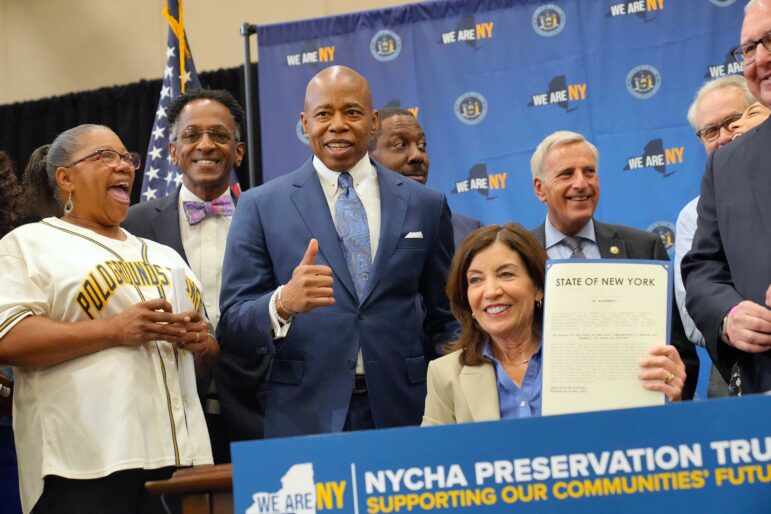The board so far includes three city housing officials, two tenants association presidents and the head of a nonprofit. NYCHA aims to initially transfer up to 25,000 units to the Trust, what supporters say will unlock federal housing subsidies to fund billions in renovations.

Ed Reed/Mayoral Photography Office.
Mayor Eric Adams and New York Gov. Kathy Hochul at the signing of legislation to create the New York City Housing Authority (NYCHA) Preservation Trust in June 2022.The New York City Housing Authority (NYCHA) on Friday appointed six members, consisting of NYCHA officials and tenant association presidents, to the newly minted Preservation Trust board—part of the struggling authority’s plan to raise billions of federal dollars to repair thousands of public housing units.
The appointed members include three city housing officials: the Interim Chief Executive Officer at NYCHA, Lisa Bova-Hiatt, NYCHA’s Chief Financial Officer Annika Lescott-Martinez and New York City’s Chief Housing Officer, Jessica Katz.
Two of the members are NYCHA tenant association presidents—Karen Blondel of Red Hook West Houses and Barbara McFadden of Nostrand Houses—while Baaba Halm, the vice president and New York market leader of the nonprofit Enterprise Community Partners, will be a board member “at large.”
The first board meeting will take place within the next few months, according to NYCHA.
Established by state lawmakers last year, NYCHA has dubbed the Trust “the first process of its kind in the county,” through which it aims to to renovate 25,000 apartments, part of an ongoing effort to revitalize the housing authority’s outdated infrastructure, with a whopping $40 billion in capital repairs needed across the system.
In a statement, Bova-Hiatt called the Preservation Trust an “innovative tool” that—alongside a separate initiative, Permanent Affordability Commitment Together (PACT)—will yield investment into NYCHA developments and the residents who live in them.
“Today’s appointments to the board are foundational to the future success, governance, and oversight of the Public Housing Preservation Trust,” Bova-Hiatt said, adding that the Trust will “usher in a new chapter for the Authority.”
NYCHA’s long term goal is to have up to 110,000 units transferred over to the Trust, which will allow it to convert those apartments to Section 8 properties through Tenant Protection Vouchers (TPV), a more lucrative federal housing subsidy than NYCHA’s current funding model, Section 9.
The initiative is similar to NYCHA’s controversial RAD-PACT program, which also converts Section 9 public housing to private Section 8 properties by transferring the units to private management companies. But unlike RAD-PACT, NYCHA will continue to directly manage the properties transferred to the Trust.
The Trust’s board members will serve three year terms, according to the housing authority. With the exception of housing officials, members will be paid a $250 stipend every four hours that can not surpass a threshold of $1,500 per month.
Three positions remain open as the Trust must fill nine seats, per state law. The remaining spots will go to two nominees appointed by NYCHA’s Citywide Council of Presidents and the other will go to a representative of a labor union who can speak for NYCHA employees.
Residents will have an opportunity to vote on whether or not they would like to see their development participate in the Trust, be converted to RAD-PACT or remain in Section 9. Voting was originally supposed to begin earlier this year, but now tenants will likely cast their ballots in the coming months, according to NYCHA.
At least 20 percent of households must participate in the vote for the results to be valid, according to NYCHA’s rules for the process—a threshold some critics have argued is too low to accurately reflect the collective wants of a given development.
READ MORE: NYCHA Plan to Put Units Under Private Management is More Than Halfway Done—But Skepticism Persists
Marquis Jenkins, one of the founding members of a tenant-led advocacy group called Residents to Preserve Public Housing, is similarly wary of how plans for Preservation Trust are unfolding.
“The city claims tenant decision-making is the future of NYCHA, but the structure of the Preservation Trust board, and the Trust in general, say otherwise,” Jenkins said. “With just four out of nine board seats reserved for tenants, residents are guaranteed only a minority voice and the illusion of decision making.”









5 thoughts on “NYCHA Names Board to New Preservation Trust, Pitched as Key Tool to Fund Repairs”
The union rank and file needs to understand what this probable change will cost them in the long term.
The union rank and file needs to understand what this probable change will cost them in the long term. I have not ever posted this in prior ovcasion
It is nice that long overdue work will be done to repair apartments. However rules must established to help maintain the developments. Violators must be fined and held accountable for destroying or vandalizing the buildings. You cannot continue to throw away money fixing up buildings if people don’t take pride in where they live..
Put cameras in elevators and stairways to capture people who allow their dogs to urinate . Fine them and warn them. Another plan should be to establish another program similar to Mitchell Lama encouraging home ownership.
,
Get read of dogs in NYCHA ! .
Most tenants that have dogs do not clean up after they dogs.
This is great news,hope is that people take much more care of their self,building,family,and community.I like the saying if you don’t stand up for something,than you fall for anything.Lets go…..Congrats,people keep on,and keep up fighting the good fight.